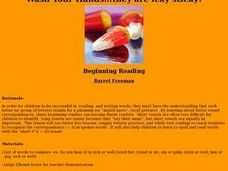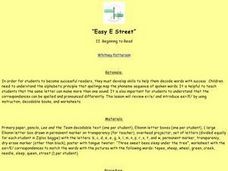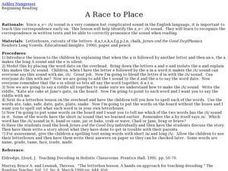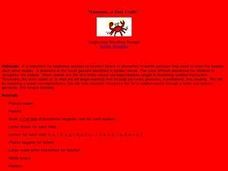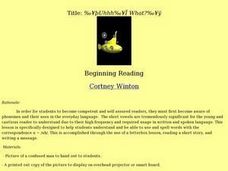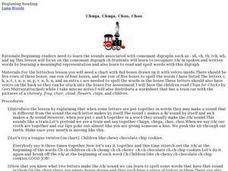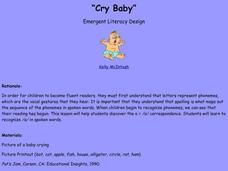Curated OER
Uh, Bugs
Students recognize the short vowel u in written and spoken language. Through listening activities, they discriminate the vowel sound /u/ from other phonemes. Students associate the phoneme with its letter representation and identify the...
Curated OER
Wash Your Hands...they are icky sticky!
Students engage in an emergent literacy instructional activity that focuses on phonemic awareness and they practice corresponding the letter "i" to its long or short sound. This type of recognition has been found to be essential to...
Curated OER
The Squeaky Creaky Elevator
Young scholars engage in an emergent literacy lesson in order to help develop the skills of letter recognition and corresponding sound of the phoneme. This is done with the use of a tongue twister using the phoneme of the letter "e".
Curated OER
Language Arts: Becoming Fluent Readers
First graders develop letter-sound correspondence skills by segmenting words according to their phonemes. Using letter tiles and letter boxes, they spell words called by the teacher. After reading several books with the teacher, 1st...
Curated OER
Lizzy the Icky Sticky Lizard
First graders recognize the short vowel i in written and spoken language. Through listening activities, they discriminate the vowel sound /i/ from other phonemes. Students associate the phoneme with its letter representation and identify...
Curated OER
Shhh
Students identify the digraph /sh/ in written and spoken language. Students practice the production of the /sh/ sound through storiesand tongue twisters. They identify the initial and final placement of the new digraph /sh/ using a...
Curated OER
"Easy E Street"
Students investigate how the same letter can make more than one sound. It is also important for students to understand that the correspondences can be spelled and pronounced differently. This lesson will review e=/e/ and introduce ee=/E/...
Curated OER
A Race to Place
Students distinguish between short vowel a and long vowel a. They are introduced to the vowel-consonant-e pattern that changes short vowel sounds into long vowel sounds. They practice spelling words with the vowel-consonant-e pattern.
Curated OER
Language Arts: Sound Recognition
First graders practice the short i sound by repeating tongue twisters. Later they write the letter i by using the analogy of drawing a straight line from the "fence" down to the "sidewalk" and putting a "basketball" above it. Other...
Curated OER
E-E-E-E-Extra E-E-E-E-Effort
Students listen to a tongue twister emphasizing the short e sound. They practice writing the letter e and attaching different words with that sound to it. They listen to a book about a dog that enhances the letter e. They write a...
Curated OER
"Aaaaaaa...a Fast Crab! "
Students participate in an emergent literacy lesson that focuses on the skill of phonemic awareness. The phoneme chosen is the letter "a". They need to correlate the sound to the letter.
Curated OER
Uhhh..What?
Students identify and become competent and in reading the letter u, pronounced /uh/. They also use and spell words with the correspondance u = /uh/ by the use of a letterbox instructional activity, reading a short story, and writing a...
Curated OER
Eddie the Elephant
Learners need to practice sight words to become proficient readers. So it is very important for children to learn common correspondences. The phoneme for the letter "e" is practiced in this lesson plan.
Curated OER
Chuga Chuga Choo Choo
First graders identify the digraph /ch/ in written and spoken language. After a brief discussion of the independent and combined sounds of the phonemes /c/ and /h/ students practice identifying initial and final placement of the new...
Curated OER
Beginning Reading
Students explore the various sounds that make up written words. They investigate the /o/ sound by creating a meaningful representation. Students spell and read words that contain the /o/ sound. They recite tongue twisters.
Curated OER
O-o-o-oh, no-o-o-o!!
Students engage in an emergent literacy lesson in order to practice the skill of phonemic awareness. They learn this skill using the phoneme for the letter "o". Students must recognize the letter as well as its sound.
Curated OER
Shhhhelly Shhhhrimp
Students read and spell words via alphabetic insight that letters stand for phonemes and spelling. They map out the phonemes in spoken words. This instructional activity will help students identify the letters s and h, along with the...
Curated OER
Cry Baby
Students recognize the short vowel a in written and spoken language. Through matching and listening activities, they discriminate the vowel sound /a/ from other phonemes. Students associate the phoneme with its letter representation...
Curated OER
Chug-a-Chug-a Choo Choo
First graders identify the digraphs in written and spoken language. After a brief discussion on the combinations of letters that comprise digraphs, 1st graders practice identifying initial and final placement of the digraph /ch/ in words...
Curated OER
A Tisket-A-Tasket, Let?s Make a Flower Basket!!!
First graders practice blending words with the phonemes /i/ and /e/. Working with a specific groups of letters, 1st graders create words using the vowels i and e. they decode those words and read them repeatedly to increase fluency.
Curated OER
Say Aaaaa for Apple
Students say words by blending sounds and phonemes. They decode words in order to read and identify and understand the letter a. This phoneme /a/ is one of the short vowels that are needed to read and write. They will show example of...
Curated OER
Chug Choo Choo
First graders identify the digraph /ch/ in written and spoken language. After a brief discussion of the independent and combined sounds of the phonemes /c/ and /h/ students practice identifying initial and final placement of the new...
Curated OER
Chimps Chugging Chocolate Milk
First graders identify the digraph /ch/ in written and spoken language. After a brief discussion of the independent and combined sounds of the phonemes /c/ and /h/ students practice identifying initial and final placement of the new...
Curated OER
Quiet Please
First graders identify the digraph /sh/ in written and spoken language. After a brief discussion of the independent and combined sounds of the phonemes /s/ and /h/ students practice identifying and spelling initial and final placement of...



